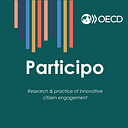Citizens at the heart of investment decisions
Besaya’s Citizens’ Jury on Fair and Inclusive Ecological Transition
Opening up cohesion policy
Around one third of the European Union’s budget (around 352 billion euros over seven years) is dedicated to cohesion policy, which promotes and supports the overall harmonious development of its Member States and regions.
Success of these investments relies on robust and capable institutions, as well as effective partnerships between governments, stakeholders, and citizens. Citizens have a key role to play in shaping decisions of public investment, as well as making public authorities more transparent and accountable.
Can innovative citizen participation methods be applied to make investment decisions more democratic and efficient in the context of EU cohesion policy?
The European Commission has partnered with the OECD since July 2020 to explore the different ways five authorities across Europe could bring citizens to the centre of their investment decisions.
Cantabria’s transition to a greener economy
One of the five authorities interested in creating opportunities for more and better citizen participation in their investment decisions is the Regional Ministry of Economy in Cantabria, Spain. It is responsible for co-ordinating and preparing the region’s various investment programmes, including the European Regional Development Fund and European Social Fund investment plan for 2021–2027.
Within the region, ten municipalities located in Besaya’s basin, are in the process of transitioning to a greener, low carbon economy. This move poses economic challenges and requires a broad public conversation — to identify the values on which the future of the area will be built, a common vision, and the way forward to get there.
As the transition will affect everyone in the area, all groups and communities should have a chance to put forward their point of view and take part in the decision-making process.
The 2020 OECD Deliberative Wave report suggests that representative deliberative processes (such as Citizens’ Juries) are especially well-placed to give citizens a voice in tackling complex, long-term issues. In a Citizens’ Jury, public authorities convene a group of people representing a wide cross-section of society for numerous days to learn, deliberate, and develop collective recommendations that consider the complexities and compromises required for solving multifaceted public issues.
The very first Citizens’ Jury in Cantabria: Citizens at the heart of investment decisions
After several months of preparation, accompanied by the OECD and Deliberativa, the region has announced the very first Citizens’ Jury in Cantabria — Besaya Citizens’ Jury.
Besaya Citizens’ Jury will be comprised of a broadly representative group of 35 everyday citizens selected by civic lottery from ten municipalities in the Besaya region.
Citizens will meet online for six weekends between 28 May and 10 July, 2021. They are asked to develop recommendations for the Ministry in answer to the following question:
“How to make the most of European Green Funds in the Besaya basin to create and / or maintain jobs that respect the criteria of a fair and inclusive ecological transition?”
A monitoring committee has been established to ensure inclusion and neutrality of the process. To open it up to the broader public, a Decidim online platform has been set up. Citizens are invited to share their ideas for the region on the platform. These will then be grouped by experts and presented to the participants of the Citizens’ Jury for consideration.
During almost 40 hours of work, members of the Citizens’ Jury will learn from experts and consider these proposals from relevant stakeholders and interested citizens.
After the learning stage, they will participate in facilitated deliberation, and develop collective, informed recommendations. Recommendations will include a shared vision for the area, as well as collective priorities for the investment projects to be funded.
Cantabria’s regional government will monitor the implementation of the recommendations that they decide to take into account — with status updates after one month, six months, and one year after the process.
Besaya’s Citizens’ Jury is an exciting example of how innovative citizen participation practices can help tackle the most pressing issues that public authorities face in the context of cohesion policy and beyond.

